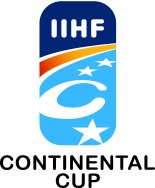IIHF Federation Cup
The Federation Cup was an official European ice hockey club competition created in 1995. It was the second European competition for club teams, intended for those teams who could not qualify for the European Cup, especially for those from Eastern European countries. It was the direct predecessor of the IIHF Continental Cup, which was played two seasons later.
In the first year of competition, 13 Eastern European teams from twelve countries participated in the tournament. In a KO-system with three qualifying groups, which qualifies the four participants in the finals. The following year was played in the same mode. Due to the increased number of participants (some Western European clubs had registered for the competition), an additional qualifying round was introduced.
IIIHF Continental Cup
The competition began in 1997–98 with 42 clubs from 26 countries, which expanded to 48 teams for the next two years. The tournament was played in seeded rounds of qualifying groups. There were three rounds of qualifying groups, with winners of qualifying groups progressing to the next round. The three winners of the third round groups entered the semifinals, along with the host club. The first round was held in September, the second in October, the third in November and the finals in December.
In the 2000–01 season, with the European Hockey League on hiatus, the Continental Cup became the de facto European club championship. The format remained the same, with 36 teams from 27 countries.
With the beginning of the IIHF European Champions Cup from 2004 to 2005, participants included national champions of countries not in the Super Six (the top six European nations according to the IIHF World Ranking), as well as teams from Super Six leagues, which included HC Dynamo Moscow and HKm Zvolen.
